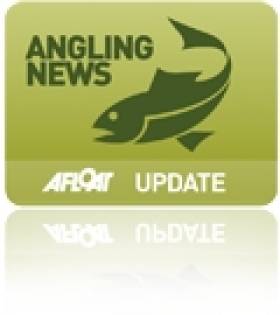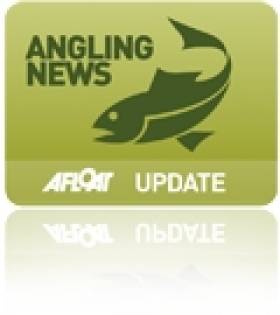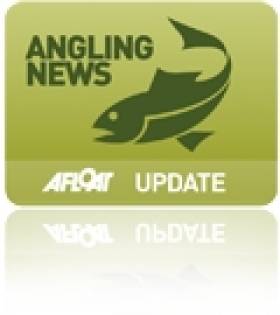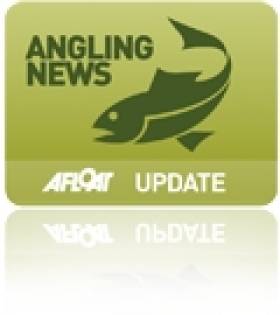Displaying items by tag: River Moy
Mayo Man Convicted Over Illegal Angling Incident At Cloongee Fishery
#Angling - A Mayo man has been convicted of obstructing a fisheries officer and failing to produce a salmon licence over an incident on the River Moy.
At a sitting of Castlebar District Court on 3 January, Judge Mary Devins imposed fines totalling €600 on David Egan of Claremorris.
Inland Fisheries Ireland (IFI) brought the case against Egan when he was found fishing a section of the Cloongee Fishery on the River Moy in the Pollagh area and was not in possession of a valid permit or salmon angling licence.
Solicitor Dermot Hewson, acting on behalf of IFI, outlined the facts of the case against Egan and his refusal to hand over his fishing gear. No defence was offered by Egan, who pleaded guilty to both charges.
IFI’s ownership of the fishing rights on the Pollagh section of the Cloongee Fishery, near Foxford, was disputed previously but was confirmed at a special sitting of Castlebar Circuit Court in 2012.
The fishery was purchased from the private owners by the former North Western Regional Fisheries Board on behalf of the State in 2005.
IFI chief executive Dr Ciaran Byrne said: “The regulation of angling on the River Moy is imperative if we are to effectively conserve and protect this valuable resource.
“Incidents of obstruction of Fisheries Officers have become quite common and this court case sends a clear message that this will not be tolerated.
Dr Byrne added that the Cloongee Fishery “is well known as a very productive salmon fishery and Inland Fisheries Ireland has ensured that permits are available locally at a reasonable cost. The fisheries resource offers huge value from both a recreational and economic perspective to the local community.
“Inland Fisheries Ireland will continue to apprehend those who carry out illegal fishing activity.”
Mayo Angling Ups and Downs as Season Draws to Close
#ANGLING - The going is tough in the last weeks of this year's angling season on Lough Mask, as Mayo Today reports.
Though anglers are still out in good numbers despite the shortening days and drop in temperature, catch numbers are way down on the angling bonanza that marked the beginning of a season that also produced a record-breaking monster trout on nearby Lough Corrib.
The best fishing was seen at the Vintners Federation of Ireland contest on the lough two weeks ago, where the prize-winning catch was a total of seven trout for 4.21kg.
Meanwhile, Celebrity World Cup champ Mick Dunne won the Molloy Cup catch-and-release contest with his catch of five trout measuring 157cm in total.
Elsewhere in Mayo, the River Moy has been more productive, with 199 salmon reported in the seven days preceding 19 September, and Lough Conn and Lough Beltra anglers have also reported some good fishing.
The news makes up for the "relative quiet" on the Newport Rover, and the significant decrease in catches on the Ballisodare Fishery.
'Extraordinary' Salmon Angling on the River Moy
#ANGLING - Mayo Today reports an extraordinary week of angling on the River Moy, with more than 800 salmon caught.
The best sport on the river was on the East Mayo Anglers' water, where an impressive 179 salmon were snagged on worm, spinner and fly.
The fly catch was particularly good, with visiting anglers Michael O'Kane and John McGinn landing fish of more than 10lbs each.
It marked a second week of great fishing in the region prompted by the persistent rains since June, with the previous week's total nearing 700 on the River Moy alone - the best possible welcome for the visit by Canadian Ambassador to Ireland (and keen Atlantic salmon fly fisherman) Loyola Hearn.
Meanwhile, on the nearby Ballisadore River the fishing was almost as good, with 225 salmon caught during the week.
Topping the catch on that short stretch of water is surely the 15lb monster salmon landed by fishery manager Dermot Glennon taken with shrimp bait.
The situation is very good news in a summer that's seen some concern over salmon stocks in Ireland's rivers.
As reported on Afloat.ie just last month, it was annonced that voluntary conservation measures were being put in place on the Foyle system for the current angling season in response to a "worrying fall" in wild salmon numbers.
Mayo Lakes and Rivers Provide for an Angling Bonanza
#ANGLING - Despite the Nor'easterly winds and rain in recent days, anglers on Co Mayo's lakes and rivers have reported good fishing, as Mayo Today reports.
Saturday 28 April was the day for the Trout Federation of Ireland's Connacht Cup on Lough Mask, which saw an impressive count of 149 trout caught by 31 anglers from seven different clubs.
Eugene Nolan of Annaghdown took the top spot with 18 trout, five more than second place finisher Martin Feerick of Partry. Third place was taken by Aidan Hodgins of Loughrea, which also took the overall team title.
Meanwhile, the River Moy had its best week of the salmon season so far, with 70 fish caught throughout the system.
Foxford Salmon Anglers member Joe Cassidy landed an enormous 16lb salmon upstream of Foxford, one of a number of catches in various parts that broke the 10lb mark.
And with water levels good thanks to the recent heavy rains, expectations have been raised for an even better catch this week.
Eddie Lands Specimen Salmon
Eddie O'Connor (left of image) of Dublin caught this magnificent specimen spring salmon of 9.2kg (20lbs 4oz) at Foxford fishery on the Moy in late May. Foxford fishery ghillie Vincent McDonnell is pictured right.



































































